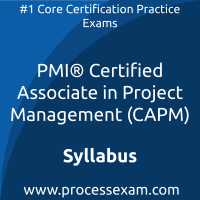 To achieve the professional designation of PMI Certified Associate in Project Management from the PMI, candidates must clear the CAPM Exam with the minimum cut-off score. For those who wish to pass the PMI Project Management Associate certification exam with good percentage, please take a look at the following reference document detailing what should be included in PMI Project Management Associate Exam preparation.
To achieve the professional designation of PMI Certified Associate in Project Management from the PMI, candidates must clear the CAPM Exam with the minimum cut-off score. For those who wish to pass the PMI Project Management Associate certification exam with good percentage, please take a look at the following reference document detailing what should be included in PMI Project Management Associate Exam preparation.
The PMI CAPM Exam Summary, PMBOK Guide, Sample Question Bank and Practice Exam provide the basis for the real PMI Certified Associate in Project Management (CAPM) exam. We have designed these resources to help you get ready to take PMI Certified Associate in Project Management (CAPM) exam. If you have made the decision to become a certified professional, we suggest you take authorized training and prepare with our online premium PMI Project Management Associate Practice Exam to achieve the best result.
PMI CAPM Exam Summary:
| Exam Name | PMI Certified Associate in Project Management |
| Exam Code | CAPM |
| Exam Fee |
PMI Member Price: USD $225 PMI Full Price: USD $300 |
| Exam Duration | 180 Minutes |
| Number of Questions | 150 |
| Passing Score | Above Target / Target / Below Target / Needs Improvement |
| Format | Multiple Choice Questions |
| Books / Trainings |
Certified Associate in Project Management (CAPM)® PMI Study Hall® Certified Associate in Project Management (CAPM)® Exam Prep Course Instructor-Led CAPM® Exam Prep Courses PMBOK® Guide |
| Schedule Exam | Pearson VUE |
| Sample Questions | PMI Project Management Associate Exam Sample Questions and Answers |
| Practice Exam | PMI Certified Associate in Project Management (CAPM) Practice Test |
PMI Project Management Associate Syllabus Topics:
| Topic | Details |
|---|---|
Project Management Fundamentals and Core Concepts - 36% |
|
| Task 1 |
- Demonstrate an understanding of the various project life cycles and processes.
|
| Task 2 |
- Demonstrate an understanding of project management planning.
|
| Task 3 |
- Demonstrate an understanding of project roles and responsibilities.
|
| Task 4 |
- Determine how to follow and execute planned strategies or frameworks (e.g., communication, risks, etc.).
|
| Task 5 |
- Demonstrate an understanding of common problem-solving tools and techniques.
|
Predictive, Plan-Based Methodologies - 17% |
|
| Task 1 |
- Explain when it is appropriate to use a predictive, plan-based approach.
|
| Task 2 |
- Demonstrate an understanding of a project management plan schedule.
|
| Task 3 |
- Determine how to document project controls of predictive, planbased projects.
|
Agile Frameworks/Methodologies - 20% |
|
| Task 1 |
- Explain when it is appropriate to use an adaptive approach.
|
| Task 2 |
- Determine how to plan project iterations.
|
| Task 3 |
- Determine how to document project controls for an adaptive project.
|
| Task 4 |
- Explain the components of an adaptive plan.
|
| Task 5 |
- Determine how to prepare and execute task management steps.
|
Business Analysis Frameworks - 27% |
|
| Task 1 |
- Demonstrate an understanding of business analysis (BA) roles and responsibilities.
|
| Task 2 |
- Determine how to conduct stakeholder communication.
|
| Task 3 |
- Determine how to gather requirements.
|
| Task 4 |
- Demonstrate an understanding of product roadmaps.
|
| Task 5 |
- Determine how project methodologies influence business analysis processes.
|
| Task 6 |
- Validate requirements through product delivery.
|
Both PMI and veterans who’ve earned multiple certifications maintain that the best preparation for a PMI CAPM professional certification exam is practical experience, hands-on training and practice exam. This is the most effective way to gain in-depth understanding of PMI Project Management Associate concepts. When you understand techniques, it helps you retain PMI Project Management Associate knowledge and recall that when needed.
